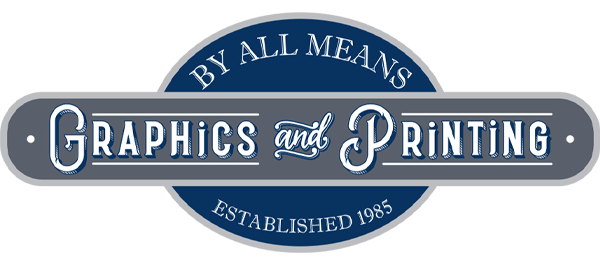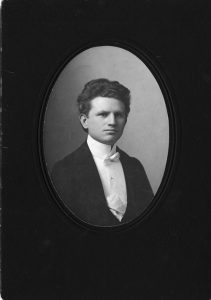Question: Who Are Northfield’s Quiz Show Aces?
This year the Academy Award for Best Picture went to “Slumdog Millionaire,” the story of a teen from the slums of Mumbai who appears on India’s version of the game show called “Who Wants to Be a Millionaire?” In the U.S., this show (which lost the question mark in its title for some reason) was hosted by Regis Philbin and was hugely popular on ABC from 1999-2002, after which it went into syndication with Meredith Vieira as the host.
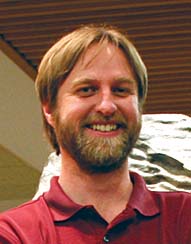
On April 10, 2001, Carleton College archivist Eric Hillemann started getting e-mails from friends who were watching “Who Wants to Be a Millionaire.” They all wanted to know, “Are you Eric the archivist from Minnesota who was the Phone A Friend tonight?”
Indeed, Hillemann had been asked to be a “lifeline” for contestant Kevin Olmstead. In a recent interview, Hillemann told me, “When he was stumped on a literature question, he came to me.”
On the day of the taping, several months before the air date, Hillemann had been phoned by the show and told that Olmstead was in the “hot seat.” Hillemann was instructed to keep his phone line free for the next half hour and to wait for the third ring to answer if he got a call (probably for the sake of drama). When Hillemann’s phone rang 20 minutes later, his heart started racing.
Philbin said, “Eric, I have your friend Kevin here. He needs your help. He is going for $250,000.” Olmstead then read the question: “Who collaborated with Walker Evans on his book ‘Let Us Now Praise Famous Men’?”
Hillemann told me, “Kevin was a little nervous and I had to prompt him to read the [multiple-choice] answers. But I knew the answer.” (See the end of this story for the answer.)
“Is that your final answer?” Regis Philbin asked Olmstead.
“Yes, I trust him implicitly,” said Olmstead. After nailing that, with the help of his phone-a-friend Eric, Olmstead proceeded to answer two more questions to win what turned out to be a $2.18 million dollar jackpot because of bonuses put into place when there had not been a million-dollar winner for five months. Olmstead’s final question was, “Who is credited with inventing the first mass-produced helicopter?” Answer: Igor Sikorsky. (So, how many of you readers knew that?)
With that final “final answer,” Olmstead became the winner of the largest cash prize in television game show history. This record was broken in 2004 when Ken Jennings won 74 consecutive games on “Jeopardy!” and garnered more than $2.5 million after asking 2,642 questions correctly (“What is_____?” is the form, as any “Jeopardy!” watcher knows, since one must respond in the form of a question.)
Eric Hillemann with his Carleton 2007 undergraduate national academic quiz championship team.
And how was Hillemann rewarded by his friend? At the time, Hillemann said he expected anything “between buying me dinner and paying the mortgage on my house.” As it turned out, Olmstead bought something appropriate for a book lover: wall-to-wall bookshelves for Hillemann’s new house. Hillemann said, “Not bad for 30 seconds of work.”

Hillemann came to know Olmstead through the college academic quiz team circuit. Hillemann has coached Carleton’s team since 1990 and Olmstead was coach of a team at the University of Michigan. They are both founding members of National Academic Quiz Tournaments (NAQT), a company which writes questions for and sponsors college tournaments.
As a graduate student, Hillemann was assistant coach of the University of Wisconsin’s College Bowl team when it won the national championship in 1986 in Atlanta. He moderates tournaments, has played on the masters circuit and has served as vice president for development and chief editor for NAQT. In 1999 and 2007, Hillemann’s Carleton team won the undergraduate national academic quiz championship. In 2003, he received the N. Gordon Carper Lifetime Achievement Award from the Academic Competition Federation for “meritorious services in sustaining and enriching collegiate academic competitions.” Hillemann is “father” of two innovations of NAQT: the undergraduate national title and Division II competition for less-experienced players.
“Millionaire” was not Hillemann’s first game show experience. In November of 1999, Hillemann was one of 3,000 aspirants to try out for “Jeopardy!” at the Mall of America. Quizzes were used to determine prowess, staffers took notes during a practice game to watch how potential contestants handled themselves and a lucky few were put on a “might call” list. Months later, Hillemann was called and his appearances were taped in August of 2000 in Culver City, California. Hillemann won $20,700 on the Columbus Day broadcast of Oct. 10 by knowing the two states that named their capitals for Christopher Columbus (Columbus, Ohio, and Columbia, South Carolina). “My then seven-year-old daughter had no trouble with my first final Jeopardy question,” said Hillemann. “Teaching my kids all the state capitals was a very early order of business in my family. Also all the presidents in order.” He did not guess the next day’s final Jeopardy question, however, which was, “This musical inspired by an opera features the songs ‘The Gods Love Nubia’ and ‘Another Pyramid.’” (Check at the end of this story.)
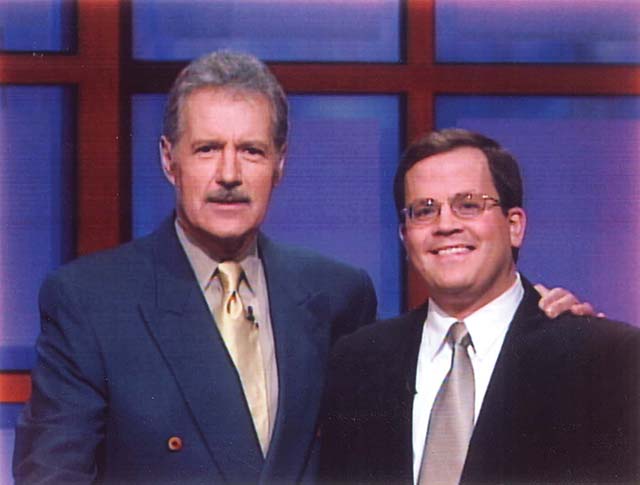
Although Hillemann did not know it at the time, the pastor of St. John’s Lutheran Church in Northfield, Joseph Crippen, was also among the chosen few at the Mall of America. Crippen was called in mid-January and flew out to tape his appearances on “Jeopardy!” in February. He won $19,601 in a show that aired on May 30, 2000, by skillful wagering and knowing the question for which this is the answer: “While pregnant with him, the mother of this actor, gazing at the Uffizi’s art [museum in Florence, Italy], first felt him move, hence his first name.” During his second appearance, Crippen was stymied by “the article of clothing named for an old character who dressed in loose trousers in Commedia dell’arte” (see end of this story for the answers). Luckily, Crippen’s worst fear did not come true. Crippen said, “I was afraid they would give me a Bible question I couldn’t answer – but as it turned out, I didn’t get even one question about the Bible.”
Neither Hillemann nor Crippen can be considered the reigning champion of “Jeopardy!” in Northfield, however. That title belongs to Carleton English professor emeritus George Soule, a 1951 alumnus of Carleton and holder of a Ph.D. degree from Yale. Soule tried out for “Jeopardy!” in California in June of 1989 while visiting a friend in Beverly Hills. He was called in January of 1990 to play in a Seniors Tournament which was taped the next month and aired in July. In his first round game, he did not have to bet anything in final Jeopardy because he had more than twice the winnings of the other two contestants. But he had no problem writing, “What is Norway?” as a response to “the first flag posted on the South Pole.”
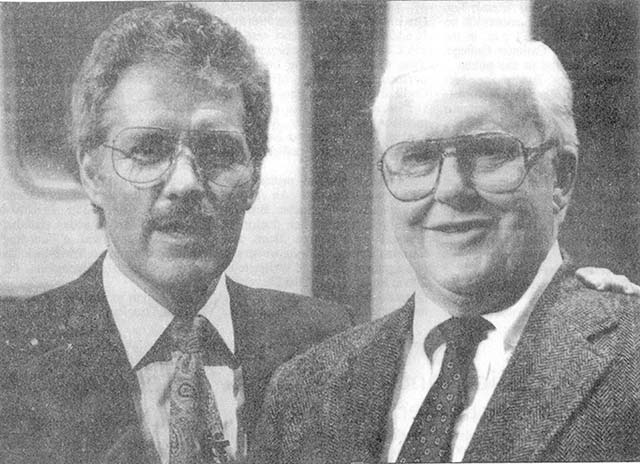
Soule defeated 14 challengers ages 53-67 during four appearances. He won the grand prize of $25,000 and was crowned Senior Champion in this tournament by knowing that Texas was recognized as an American independent country by Great Britain and France in around 1830. That victory allowed him to participate in the Jeopardy Tournament of Champions, which was taped in the fall and aired in November of 1990. Twelve top money winners and teen and college winners from the past season competed against Soule, the senior winner, for a $100,000 prize. This time Soule lost out in the first round. He is still somewhat bemused and amused that the final Jeopardy category on Nov. 7 was “Shakespeare”: “The three-word title of this play begins and ends with the same seven-letter word.” A Shakespearean scholar, Soule could not come up with “What is____?” (Check at the end of the story.)
When Soule looks back on the experience, what he remembers most is “how considerate the people at “Jeopardy!” were, always encouraging you, looking after your needs.” Soule said he played for pride, not the money, at least at first – but the monetary reward was appreciated.
In 2005, the all-time “Jeopardy!” champion Ken Jennings paid a visit to Northfield, doing some research for his 2006 book, “Brainiac: Adventures in the Curious, Competitive, Compulsive World of Trivia Buffs.” In Chapter 3 (titled “What is Erudition?”), Jennings asserted that he went to “the placid pioneer town of Northfield, Minnesota” in order to find out “just how rusty” he was in the quiz bowl world.
Jennings wrote: “The Laurence McKinley Gould Library is the academic center of Carleton College, one of tiny Northfield’s two college campuses. (Local legend has it that ‘Northfield, Minnesota’ was once the answer to a Trivial Pursuit question: ‘What’s America’s only town with two colleges and only one bar?’ There are now five bars).”
Jennings then observed eight members of Carleton’s quiz bowl team practicing with their coach in a corner of the library for upcoming competition. Jennings wrote that Hillemann was “one of the best quiz bowl players in the country” back in Jennings’ playing days with the Brigham Young University team. In this practice session, said Jennings, “The Carleton team is on fire: they aren’t even letting Eric get to the predicate of the question’s first sentence before they pounce,” pressing a buzzer that signals they have the answer. “The best players can somehow buzz with their thumbs before their brains have quite caught up.” Jennings called this “trivia on steroids.”
In his book, Jennings credited Hillemann as “the biggest reason for the team’s surprising success” in winning 31 tournaments in the past decade. Unlike some other college quiz bowl teams, there are no graduate students on Carleton’s teams. Hillemann “works his team hard,” requiring them to practice twice a week, prepare practice questions of their own and memorize lists of facts, many of which Hillemann prepares himself. (Samples: Civil War battles, Nobel Prize-winning chemists, gods of Norse mythology.)
After the practice at the library, Jennings and Hillemann went out for “pesto pizza in the only restaurant we can find still open in Northfield at nine o’clock on a weeknight,” according to Jennings. We can only hope Jennings will return someday to explore other Northfield culinary options. Perhaps he would also go to the Contented Cow for Sunday “Quiz Night” and test himself against Northfield’s best. After all, we have “Jeopardy!” champions in our midst.
One last thought: Is trivia trivial? Let’s let Ken Jennings have the final word, from his book “Brainiac”: “I’m okay with being the one in every room who might conceivably Know Weird Stuff. There’s no excuse for being a jerk or a know-it-all about it, but I’ve decided that knowledge is a good thing – an absolute good, in fact. It’s always better to know a thing than not to know it.”
Thanks to Hillemann, Soule and Crippen for answering questions that did not lead to cash prizes and for providing photos. Thanks also to the Northfield Public Library for the newspaper microfilm collection. The answers (or questions) within this story: Who collaborated with Walker Evans on his book, “Let us Now Praise Famous Men“? James Agee. The musical inspired by an opera: What is “Aida”? (Elton John and Tim Rice’s rock musical.) The actor whose mother first felt him move in her womb while gazing at art: Who is Leonardo DiCaprio? (The painter was Leonardo da Vinci.) The loose trousers named for a character in Commedia Dell’arte: What are pantaloons? The three-word title of Shakespeare’s play which begins and ends with the same 7-letter word: What is “Measure for Measure”?

